How have walk-in or wetroom shower enclosures evolved to continue to be a coveted look for modern bathroom spaces? Kitchens & Bathrooms News finds out
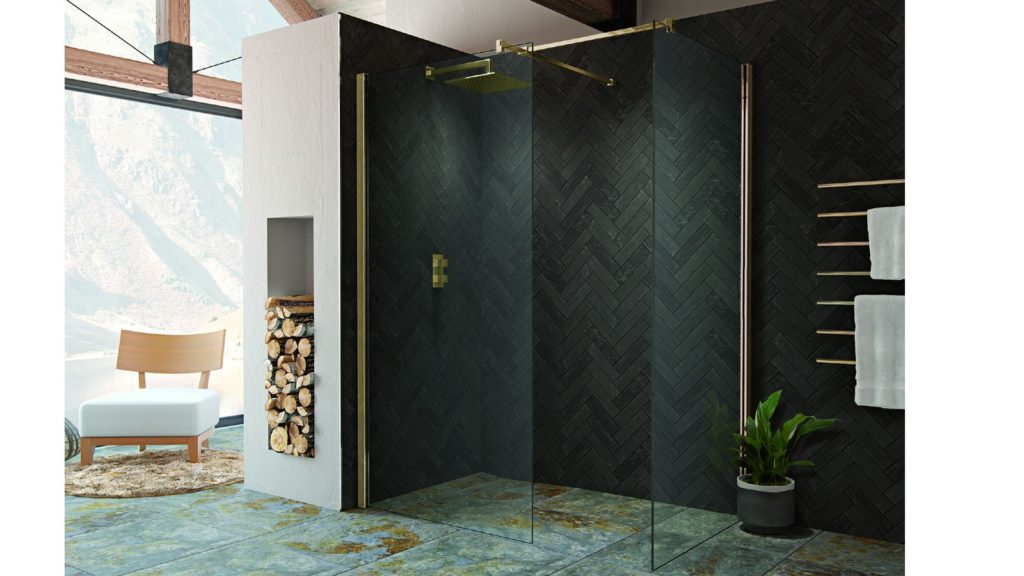
The Kudos Ultimate shower panel comes in a Brushed Gold profile to match the latest brassware trends. It has also been designed so the profiles can be swapped should the consumer change finishes in the future.
There are few technical bathroom phrases that have entered common use but those that have, such as the “power shower” and “wetroom”, are now must-haves for the home. This type of showering area not only has an enduring appeal but is still a growing market.
Sales of the walk-in or wetroom-style shower enclosure are not only supported because it creates a spa-like environment in a variety of room sizes but also suits a wide variety of users.
Sponsored Video
Sales and marketing director at Kudos Nick Graville states: “The walk-in and wetroom market continue to be the largest proportion of enclosures sold in the mid to upper level of the market.
“They are still a popular choice of enclosure due to the demand for minimalist design, accessibility, ease of use and cleaning.”
And product manager of Reflexion enclosures by PJH Richard Eaton agrees: “Over the last two years, sales for walk-in and wetroom enclosures have increased steadily as the demand for larger and more accessible showering areas continues to rise.”
Best-seller surrounds
In fact such as been the steady influence of the wetroom in shower enclosure design, manufacturers point out their most popular products continue to be a fixed screen.
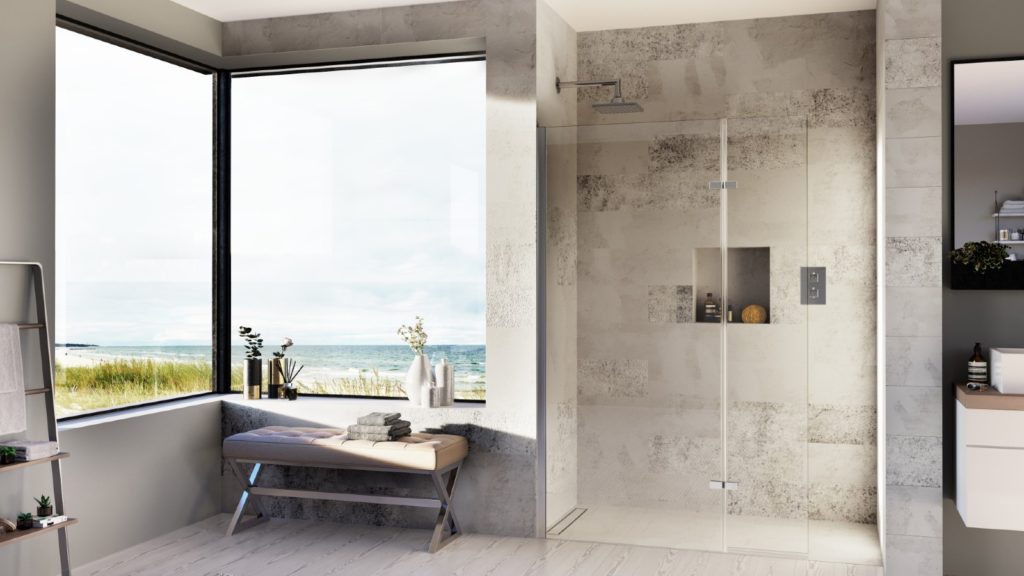
Best-selling product for Aqata over the past two years is the P446, which consists of a fixed screen and hinged panel. It is made from 8mm glass and is available with optional etching
Sales office manager of Aqata Nicola Jordan comments: “Aqata’s best-selling product is our SP446. It consists of a fixed screen and hinged panel; it has consistently performed well and has been our best seller for the past two years.”
And managing director of Rutland London Gordon Riddoch states: “Our Temple Wet Wall panel remains our most popular model.
“This is partly due to the increasing market-wide popularity for wet wall panels and partly due to the provenance and value it offers with solid brass componentry and 10mm toughened safety glass, all of which is manufactured in England.”
Including tray
But what changed has been the inclusion of a shower tray to complement these shower enclosures.
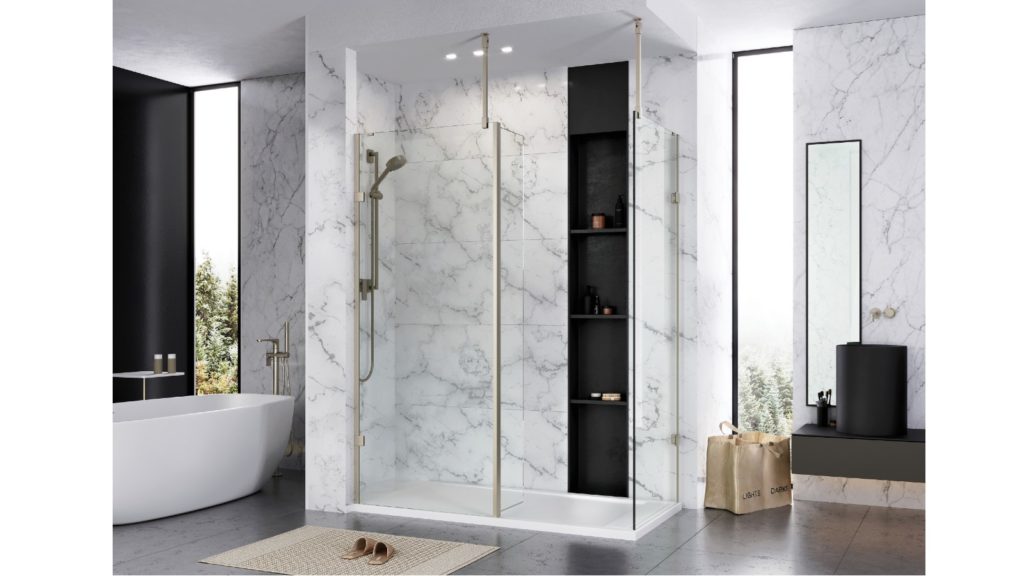
Liberty Wetroom Panels from Roman are available in plain, Black Grid digital printed or fluted glass. They come in six colour options for profiles, including Brushed Nickel pictured
It could be argued it is because of enhanced peace of mind for consumers to ensure water is retained in the area or to ensure safety for all ages in the bathroom when entering or exiting the shower.
It could even be suggested, the shower tray adds an injection of colour. CEO of Roman David Osborne notes: “We have seen an upward trend towards our anti-slip trays being used with large wetroom systems and level access showers.”
And Nick Graville of Kudos adds: “We have seen the showering market develop with a greater proportion of enclosures now fitted on to shower trays rather than a tiled floor, driven largely by the greater choice of tray finishes in the larger sizes.”
Colour customisation
Certainly, the trend for customisation and personalisation has driven interior design in the home and even infiltrated the bathroom space.
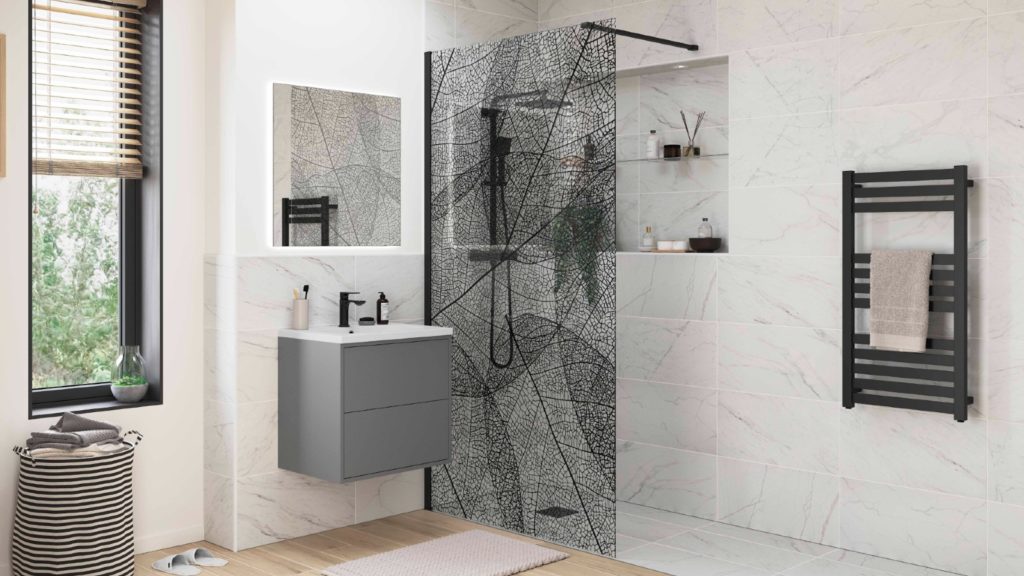
The RefleXion Black Leaf Panel in PJH’s Bathrooms to Love brand is manufactured from 8mm safety glass and stands at 2000mm high. It offers ‘Easy Clean’ glass treatment, with profile.
It has seen the development of digital printing and textures for glazing, from Crittall motifs through to reeded glass, as well as an array of profile finishes to complement the trends in brassware. Rutland London offers more than 20 finishes for its shower enclosures.
Richard Eaton of PJH points out: “Whilst the minimalist, frameless plain glass screen look is still popular, it seems that less is no longer more.
“The desire for personalisation is causing designs to evolve, for example the black framed or panelled look that we’ve seen of recent – which is great for the industrial-inspired and monochrome look.
“More patterns, colours and unusual finishes are now appearing and the use of materials other than polished chrome frames and clear glass will really grow in the next few years – such as gold or brass frames and frosted or fluted glass.”
And David Osborne of Roman agrees: “Without question the most prominent trend in the higher end of the bathroom market is colour.
“We have just introduced a fifth colour option, Brushed Brass, across our Liberty range – and also launched a new Matt White sixth option for our Liberty Wetroom Panels.”
And he indicates printed glass and textured “fluted” glass as rapidly rising in popularity.
Small deflection
Interestingly, the look which is associated with large bathroom spaces has now been modified to suit smaller spaces.
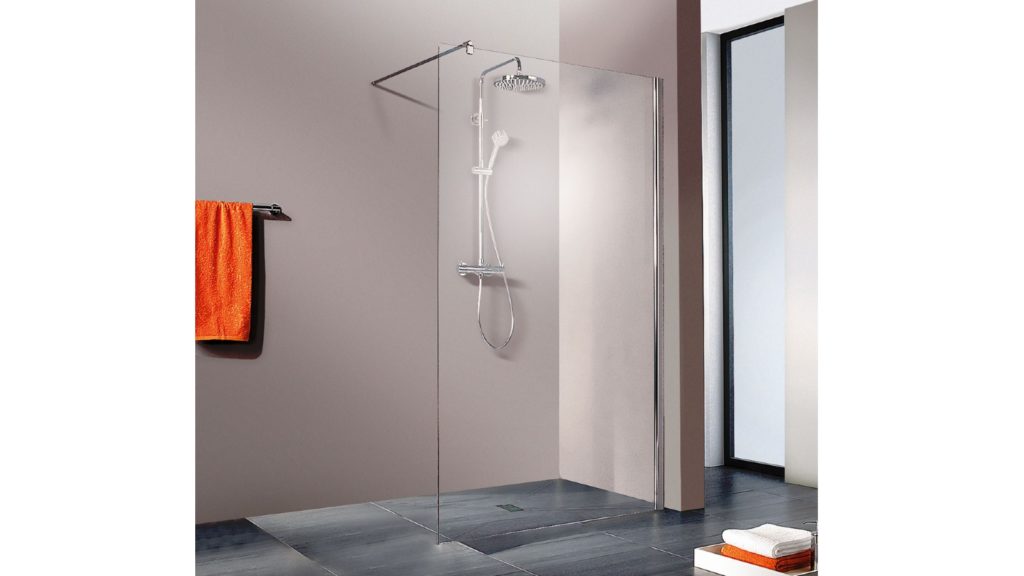
Reflecting the sales success of its walk-in enclosures, exclusive distributor for HSK RO Arnolds has added two styles to the UK stock profile including Walk-in Free.
No longer simply sized as a bath replacement, they have been created for shower rooms, and bespoke services have allowed designers to now fit them in awkward or previously restricted spaces.
Nick Graville explains: “Bath replacement is the ‘traditional’ walk-in wetroom size and where the market grew from. With so much room, all that was needed in the 1700mm length was a 1200mm panel to allow 500mm access.”
But he says there is now demand for smaller walk-ins, such as 1200mm for ensuites and warns designers this may cause water to not be retained in the showering area.
Graville warns: “As you get smaller there is more potential for water to splash out, hence the offer of deflector panels in ranges.
“Whilst these do not guarantee all water stays within the showering space, they do deflect most of the water back into the showering area.
“People are designing walk-ins on to 1200mm, which is quite small, as to retain access of 500mm, a 700mm panel must be fitted. Here a deflector is essential.”
Self-care sculpture
There seems no sign of waning in desire or demand for walk-in or wetroom-style shower enclosures.
Nicola Jordan of Aqata agrees: “The trend for walk-in enclosures shows no signs of diminishing; we feel it will continue to increase over the next two years.”
Certainly, the walk-in has embedded itself as a sculptural centrepiece of the bathroom space, and will remain a priority as part of consumers’ self-care, even when life returns to a sense of normality.



